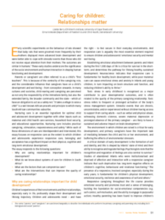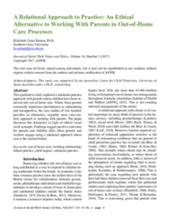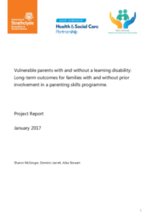Displaying 501 - 510 of 947
This paper describes promising programs and strategies designed to prevent physical punishment by parents for each of three levels of intervention − indicated, selective, and universal − and summarizes the existing evidence base of each.
This report presents and reviews 43 interventions addressing household violence within the context of humanitarian emergencies, including a range of programs focused on parenting education and support and economic strengthening.
This global review examines past systematic reviews to determine whether parenting interventions help prevent child maltreatment.
This training package is designed to enable transformative work with children affected by HIV and their caregivers.
This resource provides guidance for training professionals and parents on the Strengthening Families Protective Factor Framework.
In this essay from South African Child Gauge 2017, the authors seek to respond to the following questions: Why are caring relationships important for children’s development? What do we know about systems of care for children in South Africa? What are the factors that can compromise care? What are the interventions that can improve the quality of caring relationships?
This resource guide reflects the theme of the Office on Child Abuse and Neglect’s 20th National Conference on Child Abuse and Neglect, "Building Community, Building Hope," which was held in Washington, DC, in August 2016.
This qualitative study explored a relational practice approach with parents whose children have been removed into out-of-home care in Australia.
Families including a parent or parents with a learning disability can often have complex needs linked to issues such as poverty and mental health, and are known to be overrepresented in child care proceedings. Previous local project work with 12 families had demonstrated the potential of providing intensive support to parents with a learning disability, as well as others without a learning disability who were vulnerable for other reasons. A follow-up project 16 years later sought to re-engage with those families in order to explore their outcomes.
This brief summarises key findings of a qualitative study of the family strengthening approach of the Isibindi model.






